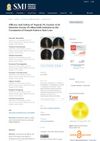10 citations,
May 2020 in “Frontiers in cell and developmental biology” MicroRNAs are important for hair growth regulation, with Dicer being crucial and Tarbp2 less significant.
2 citations,
June 2023 in “Journal of clinical medicine” Soy supplements improve various skin conditions and aging signs, with topical use boosting skin barrier function.
128 citations,
December 2006 in “Journal of Biological Chemistry” Altering SSAT affects fat metabolism and body fat in mice.
 19 citations,
January 2015 in “Journal of Clinical and Diagnostic Research”
19 citations,
January 2015 in “Journal of Clinical and Diagnostic Research” The main causes of diffuse hair loss in women are telogen effluvium and androgenetic alopecia, often related to stress and iron deficiency.
16 citations,
January 2021 in “Frontiers in veterinary science” Pigs in farrowing crates and loose-housing systems showed no difference in chronic stress levels as measured by hair cortisol.
1 citations,
February 2023 in “Ibrain” Black cumin and its nanoformulations show promise in treating neurodegenerative diseases.
 January 2023 in “Theranostics”
January 2023 in “Theranostics” A patch with curcumin-zinc can improve hair growth and health by delivering beneficial particles to the skin, increasing hair follicles, and reversing effects of a hair loss hormone.
172 citations,
March 2019 in “The EMBO Journal” FERONIA and LRX proteins help control cell growth in plants by regulating vacuole expansion.
119 citations,
June 2021 in “Heliyon” Licorice has many health benefits but should be used carefully due to possible side effects.
13 citations,
November 2022 in “Journal of King Saud University - Science” Juniperus excelsa, Olea oleaster, and Olea europaea have potential as natural antioxidants and wound healing agents.
8 citations,
July 2021 in “F1000Research” Plant-based compounds might be a promising alternative for prostate cancer treatment with fewer side effects.
 3 citations,
January 2021
3 citations,
January 2021 Non-surgical treatments like thread lifts, PRP therapy, HIFU, and radiofrequency effectively rejuvenate and tighten facial skin.
1 citations,
May 2024 in “Applied Sciences” Cordyceps militaris is a promising, cost-effective medicinal fungus with health benefits and efficient production methods.
1 citations,
January 2024 in “International journal of molecular sciences” MicroRNAs could be key biomarkers and therapeutic targets for PCOS.
1 citations,
March 2024 in “Nanomaterials” Biomimetic scaffolds are better than traditional methods for growing cells and could help regenerate various tissues.
1 citations,
December 2023 in “Nanomaterials” Combining specific nanoparticles with immune therapy significantly improves cancer treatment.
January 2024 in “Medicina” Statins may help treat PCOS by lowering androgen levels and improving cholesterol.
 April 2024 in “Clinical, cosmetic and investigational dermatology”
April 2024 in “Clinical, cosmetic and investigational dermatology” Salvianolic Acid B helps hair grow by reducing cell stress and increasing blood flow to hair follicles.
 December 2023 in “Siriraj Medical Journal”
December 2023 in “Siriraj Medical Journal” 5% Azelaic acid is as effective as 2% Minoxidil for female pattern hair loss and could be an alternative for those allergic to Minoxidil or pregnant.
 30 citations,
January 2015 in “BioMed Research International”
30 citations,
January 2015 in “BioMed Research International” Continuous light exposure in rats leads to PCOS-like symptoms and suggests sleep habits might affect the disorder's development.
 18 citations,
January 2016 in “Elsevier eBooks”
18 citations,
January 2016 in “Elsevier eBooks” Nanotechnology improves cosmetics' effectiveness and safety.
 January 2022 in “Medical research archives”
January 2022 in “Medical research archives” Taking vitamin D might improve life for MS patients and reduce skin side effects from alemtuzumab treatment.
 January 2021 in “Journal of cosmetology & trichology”
January 2021 in “Journal of cosmetology & trichology” The treatment improved hair growth and thickness in patients with hair loss, even 10 months after therapy without additional products.
 May 2023 in “Stem cell research & therapy”
May 2023 in “Stem cell research & therapy” New method efficiently isolates hair growth cells from newborn mouse skin.
March 2023 in “Anais Brasileiros De Dermatologia” Topical minoxidil is the best-supported treatment for female hair loss, but personalized plans are needed.
180 citations,
October 2019 in “British journal of haematology” Early detection and treatment of iron deficiency in pregnancy are crucial for maternal and infant health.
 1 citations,
November 2023 in “Journal of ovarian research”
1 citations,
November 2023 in “Journal of ovarian research” Agaricus subrufescens improves ovarian function and biochemical health in rats with PCOS.
 11 citations,
January 1997 in “Skin Pharmacology and Physiology”
11 citations,
January 1997 in “Skin Pharmacology and Physiology” A certain inhibitor can slow down the decrease in DNA creation in mouse hair follicles, which might help with hair growth.
30 citations,
February 2010 in “The journal of investigative dermatology/Journal of investigative dermatology” Plet-1 protein helps hair follicle cells move and stick to tissues.
 68 citations,
May 2018 in “PLOS Biology”
68 citations,
May 2018 in “PLOS Biology” Cyclosporine A may help treat hair loss by blocking a protein that inhibits hair growth.












